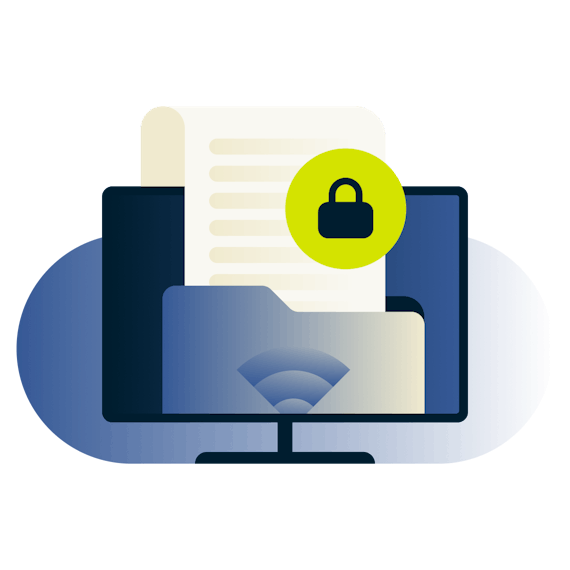Best no-logs VPN: Stay anonymous and secure
ExpressVPN’s core mission is to enable customers to use the internet privately and securely with the help of a VPN. We’re not only committed to safeguarding your privacy but also aim to be transparent about the information we do and don’t collect. We keep no activity logs and no connection logs. And we regularly invite independent auditors and testers to review the claims in our privacy policy.

What is a VPN with no logs?
A no-logs VPN is a VPN service that doesn’t record information about your online activities. This means that your VPN provider will not store your browsing history, downloads, or any other sensitive data.


Different types of VPN logs
The specific types of logs that a VPN provider can collect vary, but there are three main types:
Activity logs: Contain information about your online activity while connected to the VPN. This can include the websites you visit, the files you download, and the apps you use.
Connection logs: Contain information about your VPN connection, such as the time and date of your connection, the IP address of the VPN server you connected to, and the amount of data you transferred.
Aggregated logs: Contain information about VPN usage patterns, such as the number of users connecting to each server and the total amount of data transferred.
Some VPN providers also collect other types of logs, such as device logs (which record the type of device you are using to connect to the VPN) and payment logs (which record your payment information).
The amount of logging that a VPN provider performs can have a significant impact on your privacy. VPNs that collect activity logs are the least privacy-friendly, as they can be used to track your online activity.

Why is a no-logs VPN important?
At ExpressVPN, we believe everyone has a right to online privacy. Whether you enjoy a high degree of privacy while using a VPN will depend on your VPN provider’s practices.
When you connect to a VPN, your internet traffic is encrypted and routed through a server in another location. This hides your real IP address and makes it difficult for anyone to track your online activity—except your VPN provider. However, if your VPN provider is logging your data, they could still see what you're doing online.
An unscrupulous VPN provider (such as some free VPNs) could use your activity to build a profile on you and sell it on to the highest bidder. If a VPN company keeps logs, law enforcement could also compel them to provide a record of your online activity. This is why a VPN that keeps no logs is the safest course for true online privacy.

How a no-logs VPN policy protects you
A no-logs VPN policy is a commitment by a VPN provider to not collect or store any data about your online activity. This means that your VPN provider can’t see what websites you visit, what files you download, or what apps you use.
A no-logs policy is essential for protecting your online privacy. Without it, your VPN provider could potentially hand over your data to law enforcement, government agencies, or other third parties.
Because of ExpressVPN’s no-logs policy, should anyone try to compel ExpressVPN to release users’ online activities, we cannot supply this information because the data does not exist.

Why should I use a no-logs VPN?
There are many reasons why you might want to use a no-logs VPN. Here are a few of the most common ones:
Protect your privacy: A VPN can help you protect your privacy online. When you connect to a VPN, your traffic is encrypted and routed through a server in another location. This makes it difficult for anyone to track your online activity, including your ISP, government agencies, and hackers. Without logs, your activity can never be revealed.
Increase your overall security: A no-logs VPN can also help you improve your security online. When you connect to a VPN, your traffic is protected using strong encryption, which keeps you safe from certain cyberattacks such as man-in-the-middle attacks.
Help you avoid targeted ads: When you connect to a VPN, your IP address is replaced with the IP address of the VPN server you are connected to. This makes it difficult for advertisers to track your online activity and target you with ads. If your VPN keeps no logs, there’s also no danger that they’ll sell your activity on to advertisers.

How to choose a no-logs VPN
Not all VPNs are created equal. Some VPN providers claim to not collect logs, but they may still collect some of your data. To be sure that you're getting a true no-logs VPN, look for the following features:
A clear and concise no-logs policy
A transparent privacy policy
Third-party audits of a no-logs policy or privacy policy
A solid reputation for privacy and security
ExpressVPN: A no-logs VPN you can trust
ExpressVPN is a leading VPN service provider with a strict privacy policy, which has been audited by several independent security firms.
ExpressVPN also has a strong reputation for privacy and security. We’re registered in the British Virgin Islands, which is a jurisdiction with strong privacy laws. ExpressVPN also uses best-in-class encryption to protect your data.

Does ExpressVPN keep logs?
No, ExpressVPN does not keep logs of your online activities or personal information. This means we do not and never will collect your browsing history, traffic destination or metadata, DNS queries, or any IP addresses you are assigned when you connect to our VPN.
The best no-logs VPN service
ExpressVPN does not store any data on hard drives. Instead, all data is stored in RAM, which is erased every time the server reboots. This means that even if ExpressVPN were to be compelled to surrender user data, there would be nothing to give.
ExpressVPN has a strict no-logging policy that’s also enforced by technology. For example, we have carefully engineered our apps and VPN servers to categorically eliminate sensitive information.
ExpressVPN has been independently audited by PwC and Cure53. These audits confirmed that ExpressVPN does not keep any logs of user activity.
ExpressVPN can never be compelled to provide customer data that does not exist.
Third-party audits of our no-logs policy
The best no-logs VPNs have independent experts review their policies. This is why we’ve engaged independent audit professionals to exhaustively examine our systems to confirm whether our VPN servers are in compliance with our privacy policy, including our policy of not collecting activity logs or connection logs. Our TrustedServer technology has also been audited to verify that it operates as we’ve described.
Learn more about the third-party reports surrounding our no-logs policy and TrustedServer:
What ExpressVPN collects and why
As outlined in our Privacy Policy, ExpressVPN collects the bare minimum of data necessary to keep your VPN connection running and improve our service. This data includes:
The apps and app versions you’ve successfully activated. This helps us troubleshoot technical issues if necessary.
The dates (not times) you connect to the VPN, along with the VPN location (but not the server IP) and the source country. This helps us provide technical support.
The total amount of data you transfer. Users can transfer unlimited data, but if someone pushes more traffic than thousands of others combined and affects our quality of service for other users, we might contact that user for an explanation.
None of the above data enables ExpressVPN or anyone else to match an individual to specific network activity or behavior.

Why does ExpressVPN need
to collect any information at all?
To troubleshoot technical issues related to ExpressVPN apps
To provide technical support to customers, identify connection problems, and give country-specific advice on how to use our service
To enable ExpressVPN engineers to identify and fix network issues
ExpressVPN also collects anonymized analytics data such as speed test data, connection failures, and crash reports. These diagnostic reports do not tie back to individual users because we’ve engineered our apps to never know which user sends which data. You can specify in the settings menu of any ExpressVPN app whether you wish to send this data to us.
ExpressVPN supports
the fight for digital rights
ExpressVPN is committed not only to providing a no-logs VPN service to help people all over the world be more anonymous, but also to supporting the cause of privacy itself.
ExpressVPN is proud to support the following non-profit digital privacy advocacy groups financially:
Privacy isn’t a privilege; it’s a universal human right. You can learn more about the world of digital privacy and information security on the ExpressVPN Blog.
FAQ: No-logs VPN
Which is the best VPN service with no logs?
ExpressVPN is the best VPN service with a strict no-logs policy. We are committed to safeguarding your privacy by ensuring that we do not store any activity logs or connection logs, with multiple independent audits commissioned to verify our claims.
Do free VPNs have no logs?
No, free VPNs often do not have a strict no-logs policy. While some free VPN services may claim not to keep logs, you should exercise caution and skepticism when using them, as they need to make money somehow, likely at the expense of user privacy. Potential concerns with free VPNs include:
Limited transparency: Many free VPN providers lack transparency about their data collection practices. They may not disclose what data they log and for how long.
Ad-based revenue model: Free VPNs often rely on ads as their primary source of revenue. This means they may track your online activities to serve you targeted ads, undermining your privacy.
Data monetization: Some free VPNs collect user data and sell it to third-party advertisers or data brokers, which can compromise your privacy.
Data retention: Free VPNs may keep logs of your online activities, including your browsing history and connection data, which can potentially be shared with authorities or used for other purposes.
Security risks: Free VPNs may not invest in robust security measures, leaving you vulnerable to data breaches, malware, and other security threats.
In contrast, high-quality VPN services like ExpressVPN prioritize user privacy with a strict no-logs policy. They are more likely to invest in state-of-the-art security measures, ensuring your data remains secure and private. While premium VPNs come with a subscription fee, the added privacy and security benefits make them a worthwhile investment for those who value online privacy.
Which VPN has a no-logs policy in India?
As of June 2022, any VPN operating within India that claims to have servers there can’t be considered a true no-logs VPN. This is because of a new data law in India that requires VPN providers with Indian servers to log a lot of customer data, including names, IP addresses, and usage patterns.
ExpressVPN was the first to announce that it was removing its physical servers from India. We still offer virtual servers that give you an Indian IP address without being subject to the new data law.
So, if you want a VPN in India that respects your privacy and security, and doesn’t log your personal details, consider using a VPN like ExpressVPN, which has taken steps to protect your data by removing its physical servers from India.
What is the best free no-logs VPN?
Free VPNs are generally not log-free. It’s important to be cautious with free VPN services, as many of them may engage in logging or data collection practices that could compromise your privacy and security. Paid VPN services often provide better privacy assurances and security features.
While ExpressVPN is a paid VPN, if you start a subscription, you can cancel within 30 days and get a full refund. This means you can try our no-logs VPN risk-free.
Are no-logs VPNs safe?
Yes, no-logs VPNs are safe to use as long as they have a proven no-logs policy and are audited by a third party. A no-logs policy means that the VPN provider does not store any data about your online activity, including your IP address, browsing history, or DNS queries. This means that your online activity is completely private and cannot be tracked by anyone, including the VPN provider, your ISP, or government agencies.
Are no-logs VPNs legal?
Yes, no-logs VPNs are legal in most countries. A no-logs VPN is a VPN provider that does not keep any records of your online activity, such as your IP address, browsing history, or connection timestamps. This means that even if the government or a third party requests your data, the VPN provider will not be able to provide it.
However, there are a few countries where no-logs VPNs are banned. In these countries, the government may require VPN providers to keep logs of user activity, or they may block VPN traffic altogether.
Why do VPN services keep logs?
There are several reasons why VPN services keep logs:
To troubleshoot problems: If a user experiences problems with their VPN connection, the provider may need to look at the logs to see what went wrong.
To improve the service: The provider may use the logs to see how the service is being used and to make improvements. For example, they may use the logs to see which servers are the most popular and to add more servers in those locations.
To comply with the law: In some jurisdictions, VPN providers are required to keep logs by law. For example, in India, VPN providers are required to collect and store user data for at least five years, including names, email addresses, IP addresses, and usage patterns.
To target advertising: A lot of low-quality or free VPN providers keep logs to target advertising. For example, they may keep track of the websites that users visit and then use that information to show them targeted ads.
It is important to note that not all VPN services keep logs for the same reasons. Some providers may keep more types of logs than others. It’s important to read the privacy policy of any VPN provider carefully before you sign up to understand why they keep logs and how they use them.
Download ExpressVPN on all your devices
A single ExpressVPN subscription lets you download a VPN for every popular platform. Need a VPN for multiple devices? Set up ExpressVPN on everything you own, and use it on eight at the same time.

Learn more about using a VPN

Encrypt your data
Strong encryption protects your data and communication

Unblock websites
Access your favorite web services and defeat censorship
Need a VPN that doesn’t keep connection or activity logs?
Try ExpressVPN risk-free for 30 days.
If you’re not satisfied with ExpressVPN’s fast, private VPN service for any reason, contact Support within 30 days and get a full refund. It’s that simple.
